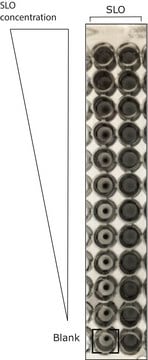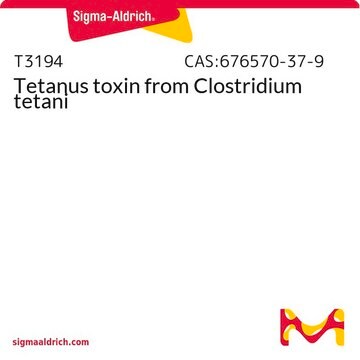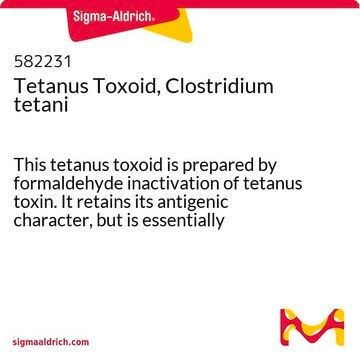T5319
Tetanolysin from Clostridium tetani
Autenticatiper visualizzare i prezzi riservati alla tua organizzazione & contrattuali
About This Item
Prodotti consigliati
Origine biologica
Clostridium tetani E88
PM
55 kDa
applicazioni
cell analysis
Temperatura di conservazione
2-8°C
Informazioni sul gene
Clostridium tetani E88 ... CTC01888(1060232)
Descrizione generale
Hemolytic activity of tetanolysin is determined using 2.5% rabbit red blood cells at 37 °C for 40 min.
Applicazioni
Tetanolysin has been used to analyze the formation of lytic pores in red blood cells (RBCs)1. It has also been used to permeabilize infected RBCs2.
Azioni biochim/fisiol
Cholesterol-binding toxin used to permeabilize cellular membranes to enhance the entry of macromolecules into the interior of the cell. Pores induced reported to be in the range of 20-50 nm.
Nota sulla preparazione
Prepared by a modification of the method of Haque, et al.
Ricostituzione
When reconstituted with 100 μl of sterile water the concentration is 1 μg/μl in 40 mM sodium phosphate buffer, pH 7.2, containing 200 mM NaCl.
Risultati analitici
Single band by SDS-PAGE.
Codice della classe di stoccaggio
11 - Combustible Solids
Classe di pericolosità dell'acqua (WGK)
WGK 3
Punto d’infiammabilità (°F)
Not applicable
Punto d’infiammabilità (°C)
Not applicable
Dispositivi di protezione individuale
Eyeshields, Gloves, type N95 (US)
Certificati d'analisi (COA)
Cerca il Certificati d'analisi (COA) digitando il numero di lotto/batch corrispondente. I numeri di lotto o di batch sono stampati sull'etichetta dei prodotti dopo la parola ‘Lotto’ o ‘Batch’.
Possiedi già questo prodotto?
I documenti relativi ai prodotti acquistati recentemente sono disponibili nell’Archivio dei documenti.
Jason W Rosch et al.
The Journal of clinical investigation, 120(2), 627-635 (2010-01-23)
Sickle cell disease (SCD) is characterized by intravascular hemolysis and inflammation coupled to a 400-fold greater incidence of invasive pneumococcal infection resulting in fulminant, lethal pneumococcal sepsis. Mechanistically, invasive infection is facilitated by a proinflammatory state that enhances receptor-mediated endocytosis
Hayley E Bullen et al.
The Journal of biological chemistry, 287(11), 7871-7884 (2012-01-19)
To survive within its host erythrocyte, Plasmodium falciparum must export hundreds of proteins across both its parasite plasma membrane and surrounding parasitophorous vacuole membrane, most of which are likely to use a protein complex known as PTEX (Plasmodium translocon of
Il team dei nostri ricercatori vanta grande esperienza in tutte le aree della ricerca quali Life Science, scienza dei materiali, sintesi chimica, cromatografia, discipline analitiche, ecc..
Contatta l'Assistenza Tecnica.








